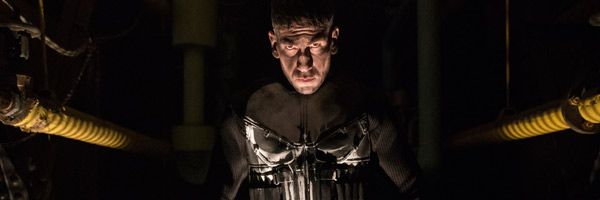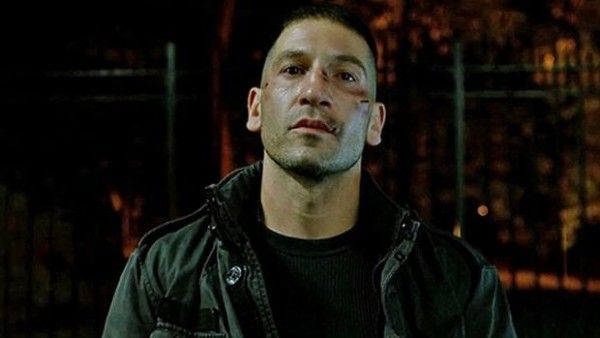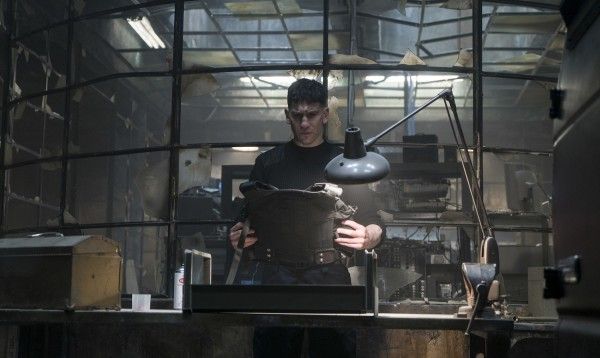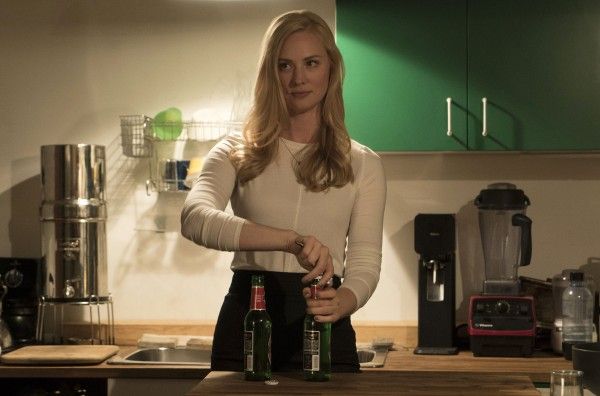The Punisher season two picks up right where the blood-soaked first season left off, with human war machine Frank Castle (Jon Bernthal) suddenly finding himself without a war to fight and all out of people to shoot in the face as vengeance for his family's death. Earlier this year, Netflix invited Collider and a few other journalists to the show's Brooklyn set to get a look at a sophomore season that is—if you can believe it—darker, more violent, and more bullet-riddled than before. In addition to getting a glimpse of Frank's junkyard trailer hideout he shares with a new teenage sidekick of sorts, Amy (Giorgia Whigham), we got the chance to speak to Bernthal, Ben Barnes, Amber Rose Revah, Jason R. Moore, Josh Stewart—who plays this season's creepy antagonist, John Pilgrim—who all confirmed that Frank Castle will never be able to hang up the old black-and-white skull vest for long.
In the following roundtable interview, Jon Bernthal discusses how the series handles gun violence, how Frank Castle is coping with his personal demons in season 2, the return of Karen Page, the iconic skull vest, and more.
Question: Gun violence has such a large presence these days, and I’m wondering what message you think The Punisher as a character and the show itself has about the topic?
JON BERNTHAL: I can’t speak for the show because I don’t write it. I think that you’d have to talk to Steve and to Marvel about that. For me, it’s a few things. Number one, art, when it’s done right, holds a mirror to society and makes you question it. And question yourself. You shouldn’t attempt to spoon feed answers or to preach. [Art should] make you look at yourself and hopefully present different sides to an argument and help make society or help make the viewer ask questions about the world in which they live in. I tend to try and avoid art that is preachy and tells you how to think. As far as I’m concerned, I think for so long now we’ve really gone through this thing in this country where a certain element has a stronghold and a monopoly on what it means to be strong or tough or masculine or patriotic, for that matter. For me, the great joy that I have in playing this role and other roles is where I got to pick soldiers and combat vets, and the guys that share their stories with me. To me, the mark of somebody who is strong, patriotic, tough is someone who has an open mind. Someone who is open to listening to all sides and not be steadfast and not be completely clinging to their own sense of, “This is what is right and this is what is wrong.” For me, what’s American to be open to all sides. Me, I’m just repulsed by the...you know how polarized it is. How it seems like both folks on both sides of that issue seem to know so little about the other side. I’m pretty much, for me personally because It’s the only thing I can speak to, I’m sickened by fundamentalism of any sort. You got to keep an open mind.
During our interview with [showrunner] Steve Lightfoot, we got into coping with and grappling with trauma as an ongoing process that you have to go through being a big part of the second season. How is he still coping with his own personal demons in this season?
BERNTHAL: I think that’s it. I’m sure we’re not allowed to say anything about plot or all that bullshit but I feel like we’re going to find his...how do you carry on?
Is Frank trying to work toward something in particular?
BERNTHAL: Well I think that’s it, man. It’s going, “Well, what’s next?” Frank’s a guy, like a lot of these folks that you speak with, one of the big influencers for Steve Lightfoot is Sebastian Junger and the book Tribe. To me, it’s a really interesting book and a really special book. For a lot of folks, I think when you suffer trauma, to be on-mission, to have a direction, to have an enemy that you know of and to be in it with likeminded people, it provides some sort of quiet from the storm. The monsters start to come in the quiet and when you have nothing to fight for. No direction. Peace sometimes can be the most scary place for a lot of folks. When you change people’s circumstances, there’s nothing that will take place of this world that you’ve come to know. That’s a lot of what this season is about for Frank, is he keeps getting drawn into this fight and he’s still grappling with the idea of, “who is the real Frank Castle?” And is there any peace?
What he keeps finding is, anybody he gets close to there’s some sort of military slang term called a “shit magnet,” I think Frank finds himself being that. Everybody he comes close to starts to get hurt. He has to deal with the fact that it’s when he’s not on-mission, when he’s not literally going after the worst of the worst, that’s when innocent people start to die. He has to grapple with that. This season he’s very much trying to figure out who he is. I don’t think he’s ever been a guy too concerned with finding peace of mind or finding harmony or finding love. He’s sadly kind of at home in the blackness and in the darkness.
What’s Frank’s relationship with Karen this season?
BERNTHAL: [Deborah Ann Woll] is the best. I have the utmost respect for her. She’s not just so talented and awesome she’s just so fucking intelligent. She elevates everything. My major complaint would be I just want more of her. I would love the whole thing to be just about that relationship.
A lot of veterans have expressed a real connection with your portrayal of Frank Castle and I was wondering if you ever felt like a role model…
BERNTHAL: Shit, I ain’t a role model for them. They’re a role model for me. That’s super humbling and I appreciate that, but the best part of the job is those friendships. I’m doing a scene tonight, again, I can’t tell you shit about it but...he’s called me twice [today] now, Gunnery Sergeant Freddie Joe Farnsworth, we’re doing some crazy marine stuff tonight. So I always talk to them. The relationships, the fact that those guys open up to me, I think anytime a vet opens up to you—not just welcomes you into their world and teaches you how to shoot or use a weapon or teaches you how guys talk to each other—but when they really start to open up and talk about their experience, that’s a treasure. I really treasure that and I appreciate that. I connect to that and try and put it into the work. At the end of the day, I’m a monkey who puts on makeup and says lines for a living. We operate under an umbrella of safety. So I try and make it as psychologically dangerous as possible and I try and take it as seriously as possible for those guys.
There’s a new young character this season, Amy, do you think she is rubbing salt in Frank’s father wounds or is she helping him work through them?
BERNTHAL: I think all of that. The most interesting relationships to me, the most interesting art to me, are the ones that don’t have a name. That’s all that Deb and I have been trying to achieve with me and Karen. It’s not saying, “Okay, this is what they are.” That literally changes from scene to scene and moment to moment. I think he hears this opportunity to work with this young woman and as they discover more about each other it runs the gamut. It can be anything. The minute you start limiting what a relationship can be and classifying it, it just becomes far less interesting. I think that’s true in life, too. When you meet somebody, anything is possible. Especially when you’re dealing with a bunch of people who have both been through a shit ton. The possibilities are endless of what those two people could end up meaning to each other. It changes from moment to moment. I really enjoy working with Georgia just for that. Because a lot of everything I lost is in her but everything I maybe secretly, quietly I hope to gain is in her as well.
We’ve seen Frank create his skull vest several times now. Why does Frank insist on doing that when he’s suiting up?
BERNTHAL: It’s tough, I remember last year, there was a whole thing when he was making the vest, there was going to be a whole scene with Micro where they’re at the computer figuring it out. There was going to be the first time with him in the vest. He was just gonna’ sort of be drinking tea and I’m like “You can’t do that. It’s gonna’ look so friggin’ stupid.” Look, man, these guys are superheroes and you got to somehow...to me, I’m really rigorous with the writers that if he’s got to wear it there’s got to be a tactical reason. There’s got to be something behind it. Because he’s not a flashy guy. He spent season two of Daredevil laughing at Daredevil. Like, “What the fuck is with that costume? What’s up with those ears?” We got to make that work. I actually feel like this year, when he puts it on, we figured out a very intelligent, very tactical reason, a very psychologically tactical reason to wear it. It makes a lot of sense.




